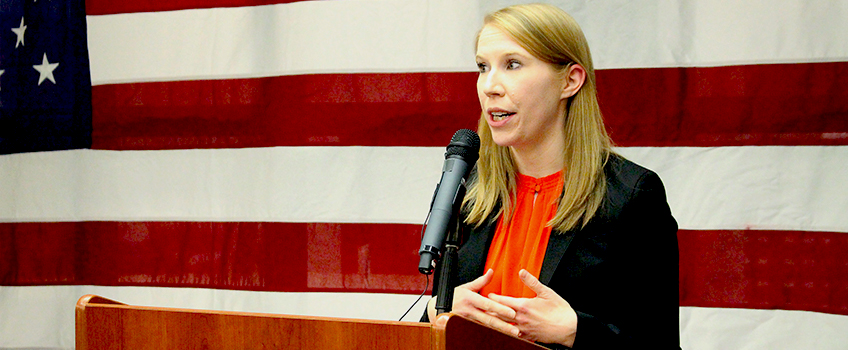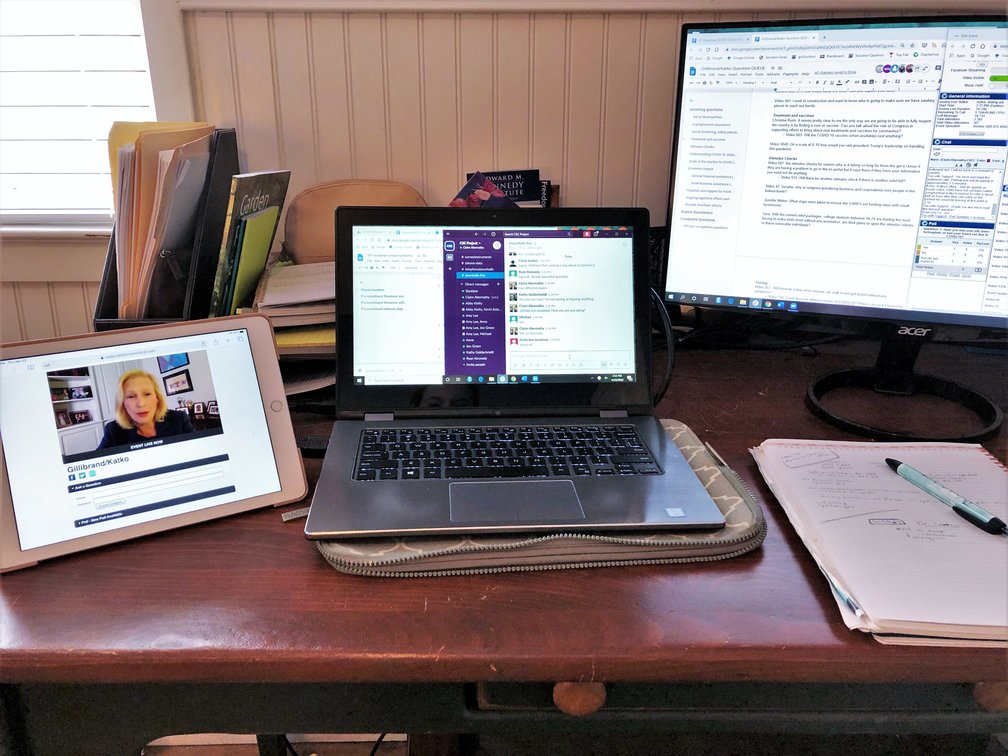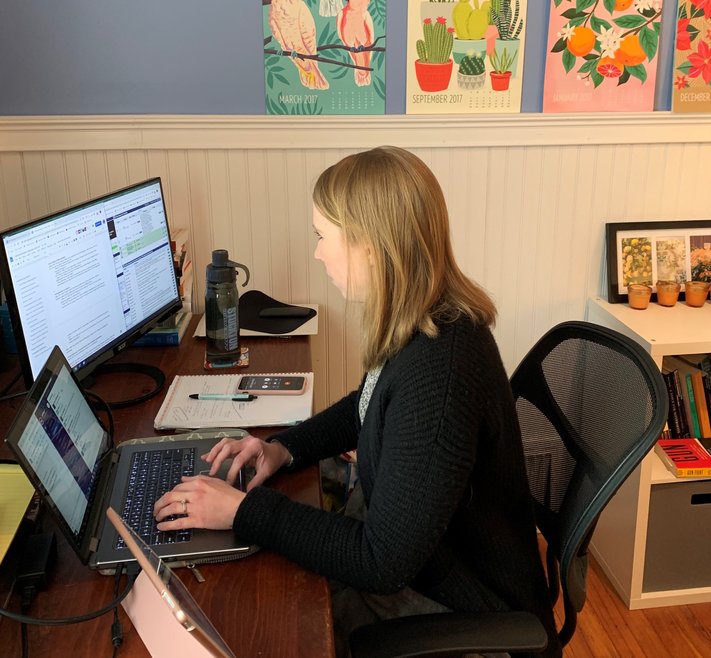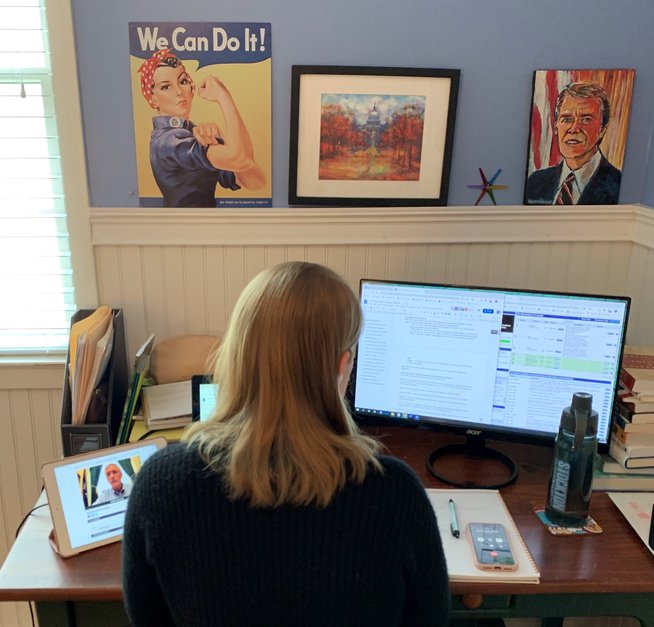Spotlight On: Claire Abernathy

Claire Abernathy, assistant professor of Political Science, is helping to bridge the technological gap between Congress and constituents by hosting online town hall meetings focused on COVID-19.
Galloway, N.J. - What if you had the chance to sit down with Congress members to ask questions about the ongoing pandemic without leaving your living room? Claire Abernathy, assistant professor of Political Science, is part of Connecting to Congress, a group helping to bridge the communication gap between members of Congress, health experts and their constituents amid COVID-19 through online town hall meetings.
“Congress as an institution remains very much behind the times in its uses of technology,” Abernathy said. “There has been little investment in upgrading out-of-date tools and it has left Congress as a whole ill-equipped to shift to doing much of their work online, especially as quickly as this [pandemic] has required them to.”
“For example, only within the last month did the House and Senate officially authorize
the use of remote working tools like Microsoft Teams or Zoom, tools that are common
across all manner of other sectors,” she said.
Abernathy became involved with Connecting to Congress (C2C) in 2018. The collaborative project includes political scientists from across the country and is based out of Ohio State University’s Institute for Democratic Engagement and Accountability.
Currently, there are limited opportunities for members of Congress to engage in deep discussions of policy issues with constituents. The C2C research team addresses this by organizing and facilitating deliberative online town hall forums between individuals and their representatives. The town halls consist of several features fostering substantive and in-depth consideration of policy issues, such as gathering a representative cross-section of constituents to attend meetings and focusing on one policy area that constituents receive nonpartisan materials about in advance of the town hall.
By leveraging new technologies to foster better communication, these features ensure members of Congress hear from a broader range of residents in their district and the conversation moves beyond the typical talking points.
C2C hosted its first online town halls in Fall 2019 focusing on workforce development with representatives including Mary Gay Scanlon (D-PA, 5th district), Donna Shalala (D-FL, 27th district) and Dan Crenshaw (R-TX, 2nd district). Representatives appeared via live video stream for a real-time discussion with questions submitted online and via phone.
“We also conduct a pre-event and post-event surveys of the participating constituents and compile reports for participating congressional offices summarizing the session and analyzing survey responses from constituents. This provides offices with informative insights into constituents’ preferences, priorities and motivations,” Abernathy said.
 Since the onset of the COVID-19 social distancing orders, C2C has been instrumental
in connecting Congress members with their constituents as face-to-face town halls,
events and individual meetings are not feasible.
Since the onset of the COVID-19 social distancing orders, C2C has been instrumental
in connecting Congress members with their constituents as face-to-face town halls,
events and individual meetings are not feasible.
“These C2C online town halls focused on COVID-19 are now serving as an important opportunity for constituents to hear key public health and economic information that they need, and for members of Congress to hear about the concerns and problems that their constituents are confronting during this pandemic,” explained Abernathy.
C2C recently added bipartisan sessions allowing two members of Congress from the same area but in different parties to jointly host a town hall. These bipartisan sessions saw record-breaking interest. At a recent town hall featuring Sen. Kirsten Gillibrand (D-NY) and Rep. John Katko (R-NY, 24th district), more than 500 questions were submitted.
“Many people have been asking specific questions about testing and public health precautions they should be taking to keep themselves safe,” said Abernathy. “Others have posed questions about the economic impact of the pandemic, asking when they can expect to be able to apply for small business loans or unemployment insurance and talking about delays they have experienced in getting needed help.”
Since joining the C2C project, Abernathy started new research to examine how Congress uses technology - or fails to use technology - in its operations. In 2019, Abernathy was invited to join the American Political Science Association Task Force on Congressional Reform, which evaluates potential reforms for Congress. Abernathy coauthored a report on the challenges with congressional technology, including reforms to upgrade systems and tools used by Congress to help the institution better adapt to emerging technology. The 2019 report stressed many ideas that have become extremely relevant in recent months.
“This is an understudied area in political science, but technology in Congress is
essential to understanding how Congress operates today,” said Abernathy.
The pandemic is revealing the inadequacies of congressional technology, which has been compounded by years of underinvestment and failures to upgrade.
“They have yet to adopt a system that would support remote voting even as it is a public health threat for Congress to gather in person,” Abernathy said. “Other countries and states have used remote voting systems for years, but leaders in Congress remain reluctant to move toward it.”
However, Abernathy and her colleagues remain optimistic that both C2C and other research efforts related to congressional technology will help Congress better evaluate and invest in tools to prepare beyond the immediate needs of legislating and representing constituents remotely.
“The long-term focus of my congressional technology research is on how we can convince Congress that making such upgrades and modernizing technology will actually be hugely beneficial in terms of their own efficiency and effectiveness,” Abernathy said.
For more information about Connecting to Congress and upcoming town halls, visit connectingtocongress.org.
Reported by Eliza Hunt


